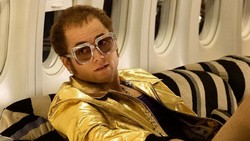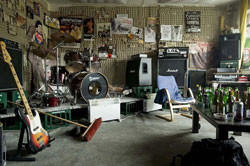Since the beginning of rock and roll, the music has always shaped the culture around it. From the 1950s to now, rock and roll has evolved into a way of life for many. With bands like The Rolling Stones to Buddy Holly, their music has touched the hearts and lives of their listeners.
Mainstream society has a way of turning events into movies so that the people who didn’t get to experience the events in real time can have a chance to live vicariously through the ones who did. Rockumentaries are a prime example of this.
A rockumentary is a dramatic biopic or documentary about rock music and musicians. Some famous rockumentaries include: Pink Floyd: Live at Pompeii (1972), Woodstock (1970), Monterey Pop (1968), and Keith Richards: Under the Influence (2015).
Some more rockumentaries that hit the big screens in recent years include: Bohemian Rhapsody (on Queen from 2018), Rocketman (on Elton John), and Judy (on Judy Garland from 2019). These movies delve into the lives of these artists, describing their accomplishments and hardships and everything in between.
The question we all must ask is what makes rock and roll so special that it receives its own category of documentaries? Rock music does have the power to unite groups that normally wouldn’t.
Professor of Music Marc Muller, a rockstar himself who has been featured on albums with Bruce Springsteen and Kelly Clarkson, thought rockumentaries shed more than just light on the artists. “Rockumentary functions as any other historical presentation,” Muller said. “Just like chronicling a war, a social movement, or state of politics of a certain era, it brings us back to another time, and hopefully helps us relate it to the present, and especially the future.”
Some of the most notable events in history exist around rock music. Woodstock, for example, was a three-day rock and roll festival that occurred in New York in 1969. It was a time of peace and unity for many, and it showed the world that hate and war doesn’t need to exist.
But I’m not saying that all rock events were positive ones. We can take a look at what occured at the Altamont Speedway free concert, when four were left dead. The Rolling Stones wanted to put on a free concert following Woodstock, but the night ended in disaster, and the peace was once again broken. Yet, it wasn’t the music that ruined it but the people in attendance.
We don’t see as many new rock bands forming as we did in the past. Muller added, “Perhaps the reason for the recent proliferation of documentaries is we’re seeing the end of an era. The modern rock stars that defined the most popular era of commercial rock of the ‘60s, ‘70s, and ‘80s are all now basically senior citizens, as well as their fans.”
Muller continued, “It’s a way of holding onto what defined them in their youths, both artists and fans. The same can be said by the explosion of tribute bands.”
“I do wonder what the revivals and tributes will be playing 30 years from now. Maybe your band?” He concluded.
It is true, and I hadn’t realized it until now, but today’s era doesn’t see as many new rock bands forming. They especially don’t embody the scene that rockstars of the past did.
Pop music has taken over today’s generation, and it definitely does not have the same party, drugs, and sex scene surrounding it like rock music did. When we, as an audience, watch rockumentaries, it is a way to escape back in time and feel things that we can’t today. It might not have been the healthiest, safest era in history, but it was for sure the most fun.
The people who got to experience concerts like the Grateful Dead, Nirvana, and the Red Hot Chili Peppers, like my parents did, have a greater appreciation for the music than those of us who weren’t born yet. However, when our generation watches these films, it is a way of gaining some of that appreciation.
Rockumentaries are created to make us feel something, whether that’s happiness or sadness. They aim to evoke these feelings from their audiences.
Of the many rockumentaries I have seen, they make me feel many different emotions, but most leave me wishing I had experienced them first hand. Yet, looking into the lives of famous stars and seeing what they went through on a normal basis can make us realize that they are just like us, dealing with the same problems and successes.
I think that is empowering for our generation, and it shows us that we can leave the same legacy if we have the ambition, motivation, and love for the music.
IMAGE TAKEN from The Hollywood Reporter and Osnat Fine Art




